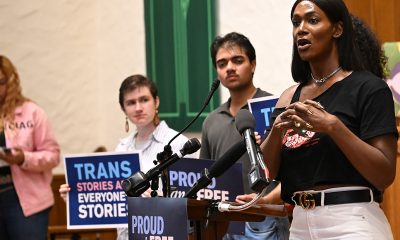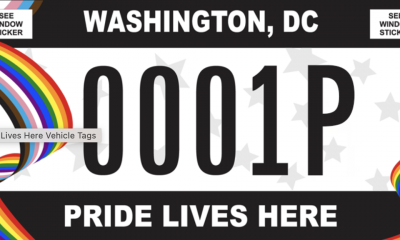News
Una ciudad cubana que no quiere ser gueto
Santa Clara se debate espacios exclusivos para la comunidad LGBT
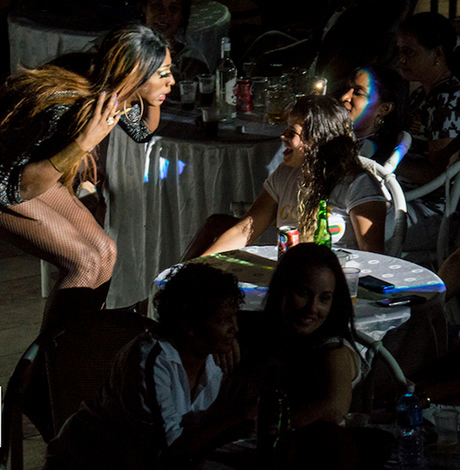
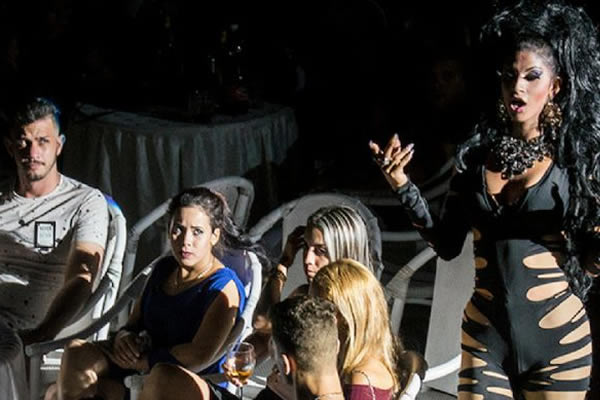
Una noche de sábado en el Cabaret Cubanacán, de Santa Clara. (Foto por Yariel Valdés González/Tremenda Nota)
Esa nota salió originalmente en el sitio web de Tremenda Nota.
SANTA CLARA, Cuba — Una de las ciudades cubanas más hospitalarias con las personas LGBTI+ también se debate entre la demanda de espacios exclusivos para las minorías sexuales y las desigualdades económicas que crecen en la Isla.
Cada sábado Miguel Antonio Castillo viaja cerca de dos kilómetros para encontrar una discoteca.
En San Diego del Valle, su primer destino, hay pocos lugares para bailar o simplemente disfrutar de espectáculos culturales. Por eso, desde que supo que existía una “noche para las personas LGBTI+” en Santa Clara, la capital de la provincia, Miguel Antonio decidió alargar su travesía por más de 30 kilómetros hasta el Cabaret Cubanacán.
“Las actividades que hacen allá [en San Diego del Valle] son muy generales,” se queja. “Y tampoco hay un día específico para los homosexuales.”
Al joven le seduce que “en las fiestas gais todos son gais.” Además, allí puede “encontrar amigos e intercambiar con personas que tienen gustos sexuales, estéticos o musicales similares, sin riesgo de sufrir homofobia.”
Más allá de las cabeceras municipales cubanas la recreación se reduce a una discoteca improvisada y a un parque central donde la gente se reúne a “cotillear.” Las fiestas concebidas para personas LGBTI+ tampoco son comunes más allá de La Habana y de algunas capitales provinciales.
En la pequeña ciudad de Camajuaní, a 20 kilómetros de Santa Clara, nunca ha prosperado una “fiesta diversa,” aseguran varias personas LGBTI+ entrevistadas por Tremenda Nota.
Según Leonel Jacomino Jiménez, promotor del proyecto Hombres que tienen sexo con otros hombres (HSH), las gestiones para crear un espacio inclusivo “tienen que hacerse sobre la base de cartas y tocando puertas para molestar a algunos funcionarios del gobierno.”
En otros casos, como ocurrió el pasado año en Sagua la Grande, una de las principales ciudades de la provincia, las fiestas LGBTI+ fracasan por falta de público o de buenas estrategias de promoción.
Solo el proyecto itinerante “Me incluyo,” organizado por el promotor cultural Ramón Silverio, creador y director de El Mejunje, ha presentado espectáculos de transformismo y otras actividades inclusivas en poblados y zonas apartadas.
Santa Clara, por su parte, cuenta con tres espacios que celebran las llamadas “fiestas gais,” y que incluyen shows de transformismo. El Centro Recreativo El Bosque, el Cabaret Cubanacán y El Mejunje de Silverio son los únicos lugares que introducen en su cartelera semanal una “noche diversa.”
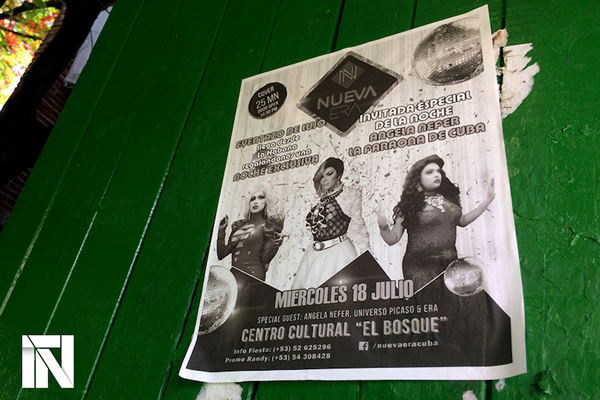
En la última década las “fiestas diversas” han alcanzado varias ciudades cubanas, aunque todavía La Habana y Santa Clara son las que ofrecen más opciones recreativas “exclusivas” para las personas LGBTI+. (Foto por Yariel Valdés González/Tremenda Nota)
¿Gueto homosexual?
Junto al Cabaret Cubanacán funciona otro espacio recreativo nombrado Disco Isla. Los públicos se muestran segregados cada sábado. De un lado hacen fila las personas gais, trans y lesbianas; del otro aparecen jóvenes heterosexuales que evitan mezclarse con “sus vecinos.” Las personas LGBTI+ permanecen en el gueto “asignado” socialmente.
“La creación de espacios exclusivos genera también una especie de exclusión,” cree Félix Izaguirre, un joven que hace fila para entrar a otra de las “fiestas diversas” de la ciudad.
“Mucha gente no va al Cabaret los sábados ni vienen a El Mejunje, precisamente porque saben que es noche gay,” dice. “Siempre existen heterosexuales que tienen amigos gais y los acompañan sin prejuicios, pero son los menos.”
Ramón Silverio creó hace más de tres décadas el centro cultural El Mejunje, acusado en sus primeros años de ser un “club exclusivo para personas gais.” Sin embargo, la institución sobrevivió el paso del tiempo y, en vez de apartar en un gueto a las personas LGBTI+, abrió las puertas al resto de la sociedad.
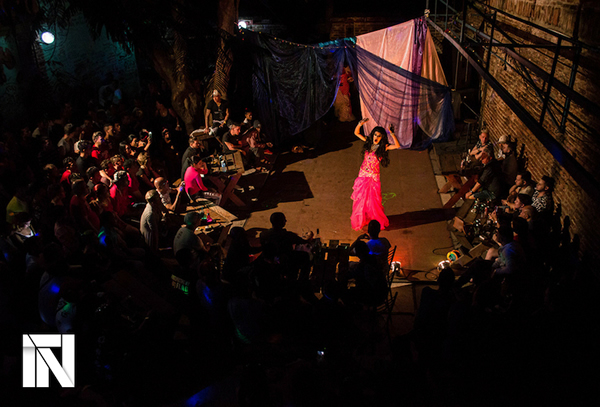
El público asiste a un show de transformismo en El Mejunje. (Foto por Yariel Valdés González)
Aun así, muchas personas homosexuales y transgéneros prefieren acudir a “espacios exclusivos para gais.” Javier Olivera, transformista que se presenta en el escenario de El Mejunje como Cinthia, aseguró que en sitios “aparentemente para heterosexuales” suele encontrarse conflictos entre la clientela homofóbica y los gais.
Por eso, Denet Oliva Triana, colega de Javier conocida como Blacuchini, respalda la existencia de lugares dedicados a la comunidad LGBTI+, aunque siente que está “en un círculo” que le lleva siempre al mismo sitio con la misma gente.
Si es caro no es incluyente
A pesar del éxito del Cabaret Cubanacán y del Centro Recreativo El Bosque ― actualmente en reparación ―, el sitio más popular para la comunidad LGBTI+ de Santa Clara sigue siendo El Mejunje, por sus razonables precios y su cercanía al centro de la ciudad.
“Cada uno se divierte donde le permiten sus ingresos,” aseguran varios entrevistados. Las incipientes clases sociales que se consolidan en Cuba hace más de una década también dividen a las minorías sexuales.
Al Cubanacán, al Bosque, van quienes cuentan con mejor economía, pues solo la entrada cuesta como mínimo 25 pesos (1 CUC, equivalente a un dólar). Ese precio, por ejemplo, quintuplica el valor del boleto de entrada a El Mejunje.
En un país donde el salario medio es 767 pesos mensuales (poco más de 30 dólares estadounidenses), “no se puede decir que un lugar sea inclusivo si cobra cuarenta pesos por la entrada,” advierte Ramón Silverio.
Reinaldo Gil, un joven artista plástico, confirma que “al Cubanacán va la gente que tiene un poco más de dinero.” Al principio, cuando acababan de abrir la “noche diversa” en el cabaret, “los mismos trabajadores de allí te discriminaban un poco, existía homofobia.”
“En el Carishow — una céntrica discoteca de la cadena de servicios extrahoteleros Palmares — a veces no aceptan que entren los homosexuales,” denuncia Gil.
Sin embargo, uno de los agentes de seguridad del Carishow aseguró a Tremenda Nota que allí nunca han existido manifestaciones de homofobia y que “se trata a todos los clientes por igual,” en tanto se comporten de acuerdo a “las normas generales establecidas” en el centro recreativo.
Hace algunos meses dos jóvenes fueron expulsados de Efe Bar, en La Habana, supuestamente por besarse dentro del establecimiento privado. También el KingBar, otro centro nocturno bastante frecuentado de la capital, invocó el derecho de admisión para negar la entrada al poeta Norge Espinosa y un grupo de activistas LGBTI+ en 2015.
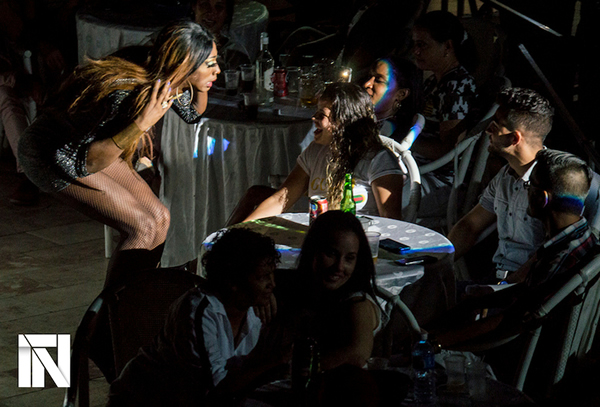
La transformista Blancuchini (a la izquierda) durante una de sus presentaciones en el Cabaret Cubanacán de Santa Clara (Foto por Yariel Valdés González)
Orlando Reinoso Castillo, barman del bar Tacones Lejanos de El Mejunje, se atreve a asegurar que este resulta el único sitio en la ciudad frecuentado a diario por personas gais que se mezclan sin dificultad con la población heterosexual, o con las chicas trans, o con los “pepillos.”
“A este lugar le llaman el bar de los escachados,” comenta, en alusión a los bajos ingresos de muchos clientes. “Además, aquí vienen las parejas, se besan y no pasa nada. La diversidad es tan natural en El Mejunje como sus ladrillos.”
New York
Two teens shot steps from Stonewall Inn after NYC Pride parade
One of the victims remains in critical condition

On Sunday night, following the annual NYC Pride March, two girls were shot in Sheridan Square, feet away from the historic Stonewall Inn.
According to an NYPD report, the two girls, aged 16 and 17, were shot around 10:15 p.m. as Pride festivities began to wind down. The 16-year-old was struck in the head and, according to police sources, is said to be in critical condition, while the 17-year-old was said to be in stable condition.
The Washington Blade confirmed with the NYPD the details from the police reports and learned no arrests had been made as of noon Monday.
The shooting took place in the Greenwich Village neighborhood of Manhattan, mere feet away from the most famous gay bar in the city — if not the world — the Stonewall Inn. Earlier that day, hundreds of thousands of people marched down Christopher Street to celebrate 55 years of LGBTQ people standing up for their rights.
In June 1969, after police raided the Stonewall Inn, members of the LGBTQ community pushed back, sparking what became known as the Stonewall riots. Over the course of two days, LGBTQ New Yorkers protested the discriminatory policing of queer spaces across the city and mobilized to speak out — and throw bottles if need be — at officers attempting to suppress their existence.
The following year, LGBTQ people returned to the Stonewall Inn and marched through the same streets where queer New Yorkers had been arrested, marking the first “Gay Pride March” in history and declaring that LGBTQ people were not going anywhere.
New York State Assemblywoman Deborah Glick, whose district includes Greenwich Village, took to social media to comment on the shooting.
“After decades of peaceful Pride celebrations — this year gun fire and two people shot near the Stonewall Inn is a reminder that gun violence is everywhere,” the lesbian lawmaker said on X. “Guns are a problem despite the NRA BS.”
India
Anaya Bangar challenges ban on trans women in female cricket teams
Former Indian cricketer Sanjay Bangar’s daughter has received support

Anaya Bangar, the daughter of former Indian cricketer Sanjay Bangar, has partnered with the Manchester Metropolitan University Institute of Sport in the U.K. to assess her physiological profile following her gender-affirming surgery and undergoing hormone replacement therapy.
From January to March 2025, the 23-year-old underwent an eight-week research project that measured her glucose levels, oxygen uptake, muscle mass, strength, and endurance after extensive training.
The results, shared via Instagram, revealed her metrics align with those of cisgender female athletes, positioning her as eligible for women’s cricket under current scientific standards. Bangar’s findings challenge the International Cricket Council’s 2023 ban on transgender athletes in women’s cricket, prompting her to call for a science-based dialogue with the Board of Control for Cricket in India and the ICC to reform policies for transgender inclusion.
“I am talking with scientific evidence in my hand,” Bangar said in an interview posted to her Instagram page. “So, I hope, this makes an impact and I will be hoping to BCCI and ICC talking with me and discussing this further.”
On Nov. 21, 2023, the ICC enacted a controversial policy barring trans women from international women’s cricket. Finalized after a board meeting in Ahmedabad, India, the regulation prohibits any trans player who has experienced male puberty from competing, irrespective of gender-affirming surgery or hormone therapy. Developed through a 9-month consultation led by the ICC’s Medical Advisory Committee, the rule aims to safeguard the “integrity, safety, and fairness” of women’s cricket but has drawn criticism for excluding athletes like Canada’s Danielle McGahey, the first trans woman to play internationally. The policy, which allows domestic boards to set their own rules, is slated for review by November 2025.
Bangar shared a document on social media verifying her participation in a physiological study at the Manchester Metropolitan University Institute of Sport, conducted from Jan. 20 to March 3, 2025, focused on cricket performance. The report confirmed that her vital metrics — including haemoglobin, blood glucose, peak power, and mean power — aligned with those of cisgender female athletes. Initially, her fasting blood glucose measured 6.1 mmol/L, slightly above the typical non-diabetic range of 4.0–5.9 mmol/L, but subsequent tests showed it normalized, reinforcing the study’s findings that her physical profile meets female athletic standards.
“I am submitting this to the BCCI and ICC, with full transparency and hope,” said Bangar. “My only intention is to start a conversation based on facts not fear. To build space, not divide it.”
In a letter to the BCCI and the ICC, Bangar emphasized her test results from the Manchester Metropolitan University study. She explained that the research aimed to assess how hormone therapy had influenced her strength, stamina, haemoglobin, glucose levels, and overall performance, benchmarked directly against cisgender female athletic standards.
Bangar’s letter to the BCCI and the ICC clarified the Manchester study was not intended as a political statement but as a catalyst for a science-driven dialogue on fairness and inclusion in cricket. She emphasized the importance of prioritizing empirical data over assumptions to shape equitable policies for trans athletes in the sport.
Bangar urged the BCCI, the world’s most influential cricket authority, to initiate a formal dialogue on trans women’s inclusion in women’s cricket, rooted in medical science, performance metrics, and ethical fairness. She called for the exploration of eligibility pathways based on sport-specific criteria, such as haemoglobin thresholds, testosterone suppression timelines, and standardized performance testing. Additionally, she advocated for collaboration with experts, athletes, and legal advisors to develop policies that balance inclusivity with competitive integrity.
“I am releasing my report and story publicly not for sympathy, but for truth. Because inclusion does not mean ignoring fairness, it means measuring it, transparently and responsibly,” said Bangar in a letter to the BCCI. “I would deeply appreciate the opportunity to meet with you or a representative of the BCCI or ICC to present my findings, discuss possible policy pathways, and work towards a future where every athlete is evaluated based on real data, not outdated perceptions.”
Before her transition, Bangar competed for Islam Gymkhana in Mumbai and Hinckley Cricket Club in the U.K., showcasing her talent in domestic cricket circuits. Her father, Sanjay Bangar, was a dependable all-rounder for the Indian national cricket team from 2001 to 2004, playing 12 test matches and 15 One Day Internationals. He later served as a batting coach for the Indian team from 2014 to 2019, contributing to its strategic development.
Cricket in India is a cultural phenomenon, commanding a fanbase of more than 1 billion, with more than 80 percent of global cricket viewership originating from the country.
The International Cricket Council, the sport’s governing body, oversees 12 full member nations and more than 90 associate members, with the U.S. recently gaining associate member status in 2019 and co-hosting the 2024 ICC Men’s T20 World Cup. The BCCI generated approximately $2.25 billion in revenue in the 2023–24 financial year, primarily from the Indian Premier League, bilateral series, and ICC revenue sharing. The ICC earns over $3 billion from media rights in India alone for the 2024–27 cycle, contributing nearly 90 percent of its global media rights revenue, with the BCCI receiving 38.5 percent of the ICC’s annual earnings, approximately $231 million per year.
Women’s cricket in India enjoys a growing fanbase, with over 300 million viewers for the Women’s Premier League in 2024, making it a significant driver of the sport’s global popularity. The International Cricket Council oversees women’s cricket in 12 full member nations and over 90 associate members, with the U.S. fielding a women’s team since gaining associate status in 2019 and competing in ICC events like the 2024 Women’s T20 World Cup qualifiers. The BCCI invests heavily in women’s cricket, allocating approximately $60 million annually to the WPL and domestic programs in 2024–25, while contributing to the ICC’s $20 million budget for women’s cricket development globally. India’s media market for women’s cricket, including WPL broadcasting rights, generated $120 million in 2024, accounting for over 50 percent of the ICC’s women’s cricket media revenue.
“As a woman, I feel when someone says that they are women, then they are, be trans or cis. A trans woman is definitely the same as a cis woman emotionally and in vitals, and specially, when someone is on hormone replacement therapy. Stopping Anaya Bangar from playing is discrimination and violation of her rights. It is really sad and painful that every transwoman need to fight and prove their identity everywhere,” said Indrani Chakraborty, an LGBTQ rights activist and a mother of a trans woman. “If ICC and BCCI is stopping her from playing for being transgender, then I will say this to be their lack of awareness and of course the social mindsets which deny acceptance.”
Chakraborty told the Blade that Bangar is an asset, no matter what. She said that the women’s cricket team will only benefit by participation, but the discriminating policies are the hindrance.
“Actually the transgender community face such discrimination in every sphere. In spite of being potent, they face rejection. This is highly inhuman. These attitudes is regressive and will never let to prosper. Are we really in 2025?,” said Chakraborty. “We, our mindset and the society are the issues. We, as a whole, need to get aware and have to come together for getting justice for Anaya. If today, we remain silent, the entire community will be oppressed. Proper knowledge of gender issues need to be understood.”
The BCCI and the International Cricket Council have not responded to the Blade’s repeated requests for comment.
New York
Zohran Mamdani participates in NYC Pride parade
Mayoral candidate has detailed LGBTQ rights platform

Zohran Mamdani, the candidate for mayor of New York City who pulled a surprise victory in the primary contest last week, walked in the city’s Pride parade on Sunday.
The Democratic Socialist and New York State Assembly member published photos on social media with New York Attorney General Letitia James, telling followers it was “a joy to march in NYC Pride with the people’s champ” and to “see so many friends on this gorgeous day.”
“Happy Pride NYC,” he wrote, adding a rainbow emoji.
Mamdani’s platform includes a detailed plan for LGBTQ people who “across the United States are facing an increasingly hostile political environment.”
His campaign website explains: “New York City must be a refuge for LGBTQIA+ people, but private institutions in our own city have already started capitulating to Trump’s assault on trans rights.
“Meanwhile, the cost of living crisis confronting working class people across the city hits the LGBTQIA+ community particularly hard, with higher rates of unemployment and homelessness than the rest of the city.”
“The Mamdani administration will protect LGBTQIA+ New Yorkers by expanding and protecting gender-affirming care citywide, making NYC an LGBTQIA+ sanctuary city, and creating the Office of LGBTQIA+ Affairs.”
-

 U.S. Supreme Court4 days ago
U.S. Supreme Court4 days agoSupreme Court upholds ACA rule that makes PrEP, other preventative care free
-

 U.S. Supreme Court4 days ago
U.S. Supreme Court4 days agoSupreme Court rules parents must have option to opt children out of LGBTQ-specific lessons
-

 National5 days ago
National5 days agoEvan Wolfson on the 10-year legacy of marriage equality
-

 Congress5 days ago
Congress5 days agoSenate parliamentarian orders removal of gender-affirming care ban from GOP reconciliation bill



